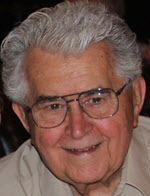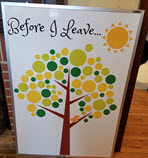The way I lived my life.

My father didn’t shy away from tough conversations or hard decisions. He faced life head on, he knew what he wanted for end-of-life care. At the end of his congestive heart failure journey, he got his wish to determine his own fate. Dad, exhausted by the struggle and in consultation with his doctor, made the decision to turn off the defibrillator.
I’d been living with my parents for almost a year, getting home occasionally on weekends. I was headed home one beautiful Saturday morning, ready to sleep in my own bed, get my haircut, see some friends, when his doctor called me. “Your dad has decided he wants to turn the defibrillator off.” Even though I knew it was coming, it was still hard to hear. “When?” His doctor: “Not until tomorrow. It will give everyone a chance to see him.” I immediately called my brother in NC, finished driving to my house, got some additional clothes, drove back to my mother and told her.
I am grateful my father was able to make this choice himself. Even though my sister-in-law and I knew what he wanted, it would have been hard to make that final decision. I know how lucky we were. Many families are forced to make difficult decisions about life support and feeding tubes. Decisions about medical interventions that keep us going when the body, the mind, and the spirit are tired.
This is why I am passionate about having an end-of-life conversation. Because I believe having a conversation with yourself and your loved ones so they understand your wishes, is one of the greatest gifts you can give them. It is why I am highlighting National Healthcare Decisions Day, and tools that can help start this conversation.
If you are not clear on what an Advance Directive is, you can read this article Advance Directives. It explains them (there is more than one). Today’s blog focuses on resources and suggestions to help start the “Conversation of Your Life.” The time to have this conversation is when you are healthy, not in a crisis.
Your Physician
Your doctor is one place to start the conversation. You will need to ask for this consultation, doctors in general do not bring it up first. If you have Medicare Part B (Medical Insurance), as of January 1, 2016 Centers for Medicare & Medicaid Services (CMS) created billing codes to cover voluntary Advance Care Planning as part of your Yearly “Wellness” visit. It allows doctor’s office to bill Medicare for this conversation. The conversation can be with your doctor, or other qualified healthcare professional that spends time with a patient, family member, or surrogate to explain and discuss advance directives. The first meeting is 30 minutes face-to-face with the opportunity for a 30-minute follow-up with the patient, family member(s), and/or surrogate.
National Healthcare Decisions Day (NHDD)
This organization is an initiative of “The Conversation Project” and “exists to inspire, educate and empower the public and providers about the importance of advance care planning.” This year NHDD falls on April 16 and kicks off weeklong programming that continues through the year, across the country. Local organizations that participate can be found here: Heat Map.
The Conversation Project
The Conversation Project is a public resource and is considered the “mothership” of Advance Care Planning for many organizations. On their website you will find, Your Conversation Starter Kit, which is available in multiple languages. It helps get your thoughts together before you have the conversation with loved ones. It is not meant to be completed in one sitting. In addition, The Conversation Project’s adviser to faith, Rev. Rosemary Lloyd is hosting a free six-part web based course on how to infuse having conversations about value-centered health care decision making into the life and work of faith communities.
New Jersey Health Care Quality Institute (NJHCQI): Conversation of Your Life
Through the NJHCQI Mayors Wellness Campaign, several counties in NJ participate in a program called Conversation of Your Life. Conversation of Your Life programming in each county is directed by task forces of advisors, including medical professionals, clergy, lawyers, elected officials, lay people, and other individuals dedicated to improving advance care planning in New Jersey. NJHCQI regularly convenes the county task forces and supports their work.
I am proud to participate in my county’s Conversation of Your Life outreach. Here is a list of programs we conduct that you might consider using with your faith group, social organization, community center and family.
- Film Screening: “The Bucket List” and “Being Mortal” are two of the films used to start the conversation. There is a brief discussion with questions to think about before the screening and a follow-up discussion after viewing the film. Discussion questions from the book “The Conversation: A Revolutionary Plan for End-Of-Life Care by Dr. Angelo E. Volandes is often used to direct this discussion.
- Panel Discussions: Panels are held in a variety of venues like a community center, a church, or library. The panel typically consists of a member of the clergy, a lawyer and a clinical person to ensure the broadest range of questions and opinions are heard. The most common question, “What advance directive document is right for me?”
- Card Games: Go Wish is one example. Card games help groups large and small to prioritize their wishes before documenting them. It is a great tool for a family to play together. It is used successfully at churches, senior centers, libraries, and other community-based organizations.
- In-depth discussion of Five Wishes. This walks people through the Five Wishes document, a legal advance directive in 42 states, including New Jersey. The Five Wishes is often referred to as an advance directive with a soul, because it is written in everyday, thoughtful language.
- Author Visits: Speaker may be a local, regional or national figure but their book must touch on some aspect of the importance of Advance Care Planning.
- Coffee and Conversation is a great concluding event after someone has participated in an Advance Care Planning Outreach Program. It allows participants to sit down with someone that is knowledgeable and guide them through completing and signing an Advance Directive.
Art Display – NJHCQI created its “Before I Leave” board. This is a tool that allows people to write something from their bucket list on the “Tree of Life”. It’s a great way to build excitement for a program, and a great visual to start the conversation.
I’m grateful we had time with my dad and the chance to say goodbye. I’m grateful he died with dignity and grace in the same way he lived his life, dying as he wished, surrounded by those who loved him.
About the New Jersey Health Care Quality Institute
The New Jersey Health Care Quality Institute is the only independent, nonpartisan, multi-stakeholder advocate for health care quality in New Jersey. The Quality Institute’s mission is to undertake projects and promote system changes that ensure that quality, safety, accountability, and cost-containment are closely linked to the delivery of health care services in New Jersey.
@NJHCQI
About the Mayors Wellness Campaign
The Mayors Wellness Campaign is a program of the New Jersey Health Care Quality Institute in partnership with the New Jersey State League of Municipalities. The program empowers mayors across New Jersey with tools, strategies, and support to champion health and wellness in their communities.
@NJHCQI_MWC
Disclaimer: The material in this blog is for educational purposes only. It is not intended to replace, nor does it replace, consulting with a physician, lawyer, accountant, financial planner or other qualified professional.


 Art Display – NJHCQI created its “Before I Leave” board. This is a tool that allows people to write something from their bucket list on the “Tree of Life”. It’s a great way to build excitement for a program, and a great visual to start the conversation.
Art Display – NJHCQI created its “Before I Leave” board. This is a tool that allows people to write something from their bucket list on the “Tree of Life”. It’s a great way to build excitement for a program, and a great visual to start the conversation.
PSRC will be offering a workshop on Healthcare Directives on April 16 at 1 pm. We’ll talk about what the documents are and how to have the conversation.
Go to princetonsenior.org to register. All are welcome.
Thank you Susan for letting us know about the Healthcare Directives workshop on April 16 at 1:00 pm at the Princeton Senior Resource Center. If you have never visited PSRC, I urge you to do so. It is an amazing resource right here in Central NJ.